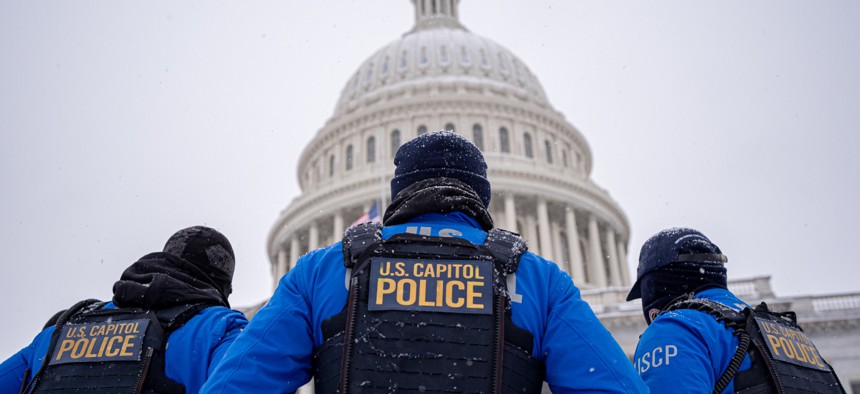
U.S. Capitol Police officers stand guard in a winter storm in the nation's capital on Jan. 6, 2025 in Washington, D.C. Two federal law enforcement employee associations are arguing for stronger exemptions to proposed benefits cuts. Andrew Harnik / Getty Images
House GOP’s law enforcement ‘exemption’ from retirement cuts is illusory, groups say
A pair of organizations representing federal law enforcement officers urged lawmakers to strengthen carveouts of an array of proposed cuts to federal workers’ retirement benefits but stopped short of calling for their withdrawal.
House Republicans’ efforts to shield law enforcement and other federal workers with mandatory early retirement ages from planned cuts to their pension benefits aren’t all they’re cracked up to be, according to a pair of employee groups.
Last month, GOP members of the House Oversight and Reform Committee advanced that panel’s portion of budget reconciliation legislation aimed at reducing federal spending to pay for tax cuts for the wealthy and increased immigration enforcement. The measure includes an array of cuts to federal workers’ retirement benefits, such as requiring all Federal Employees Retirement System to pay 4.4% of their basic pay toward their annuity benefit, ending the FERS supplement for employees who retire before Social Security kicks in at age 62, reducing the value of the FERS annuity from the average of the highest three years of federal salary to the average of the highest five years and requiring new federal hires to pay an additional 5% of their paycheck toward their pension if they wish to retain their civil service protections.
Though House Republicans touted the addition of an exemption to the end of the FERS supplement for positions that are subject to an early mandatory retirement age, such as federal law enforcement officers and air traffic controllers, a pair of employee groups warned that under the bill, retirement would be “untenable” for most federal law enforcement personnel.
In a letter to House leaders Monday, FBI Agents Association President Natalie Bara and Federal Law Enforcement Officers Association National President Matthew Silverman said the bill’s language effectively forces employees to remain on the job until they hit the mandatory retirement age for their position in order to qualify for the FERS supplement.
“We appreciate the efforts made by the Oversight Committee to work with us to in many ways lessen the negative impacts of its proposed retirement system changes on federal law enforcement officers,” Bara and Silverman wrote. “However, the changes approved by the committee last month, which limit the supplement to only those who reach mandatory retirement age, continue to pose significant risks to national security and the retention of experienced federal law enforcement officers. In short, these changes would not only make earned voluntary retirement untenable for the brave men and women of the FBI, Secret Service, Drug Enforcement Agency, ICE-Homeland Security Investigations, Customers and Border Protection, and every other federal agency, but it is patently unfair to change the rules on those who have dedicated their lives to the defense of this nation.”
The two groups warned that if the bill continues to advance through Congress as currently written, federal agencies will see a mass exodus of retirement-eligible law enforcement personnel, scrambling to retire under the current rules before the legislation is enacted. Federal workers across government who have accepted or are considering the Deferred Resignation Program or Voluntary Early Retirement Authority are similarly weighing accelerating their departure to avoid what often amounts to a 30% reduction in retirement income.
“As the Office of Personnel Management reported in 2023, roughly 48,000 (34%) out of a universe of approximately 120,000 federal law enforcement officers are eligible to retire by fiscal 2023,” they wrote. “[Cutting] this benefit would have an immediate effect on attrition rates across the government and create a strong incentive for eligible federal law enforcement officers to retire earlier than planned—before the new rules take effect—draining agencies of institutional knowledge and seasoned leadership at a time of heightened national and global threats.”
Unlike unions and other federal employee advocacy groups, the two associations stopped short of calling on Congress to withdraw the proposals altogether. But they did request that lawmakers develop expanded carveouts for law enforcement workers elsewhere in the bill.
“In addition, we also encourage you to exempt all federal law enforcement officers from the changes to FERS contribution rates and moving the annuity calculation from a ‘high-3’ to a ‘high-5,’” Bara and Silverman wrote. “The bill as passed by the House Oversight Committee provided exemptions from these provisions for those eligible for law enforcement retirement coverage. But this language would not extend to most uniformed federal police officers.”
How are these changes affecting you? Share your experience with us:
Erich Wagner: ewagner@govexec.com; Signal: ewagner.47
NEXT STORY: Getting ready to retire







